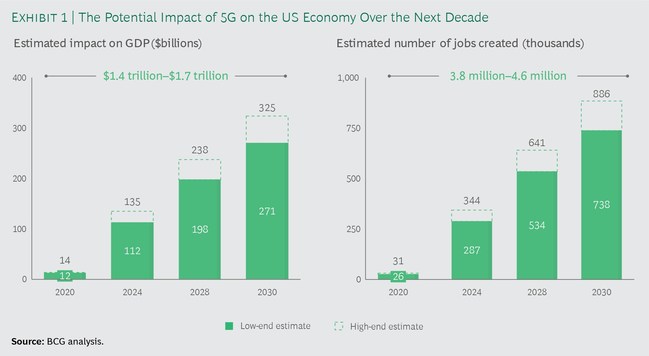BCG Study Estimates the Addition of Approximately 4.5 Million Jobs and an Increase of About $1.5 Trillion in US GDP Over this Decade
5G networks could create about 4.5 million jobs in the US and add roughly $1.5 trillion to the country’s GDP, according to a new report from Boston Consulting Group (BCG), commissioned by CTIA, the wireless industry association.
HR Technology: QuickStart Is Excited to Announce Partnership with University of Texas at Arlington to Offer Online IT Bootcamps
BCG’s analysis shows that 5G will contribute to US GDP and employment growth by enabling of innovation that will transform all sectors of America’s economy across cities and communities of all sizes.

“Our analysis shows that the 5G economy’s impact will be broad and deep, unlocking significant benefits across the US and enabling new use cases across all industries, including health care, education, and agriculture,” said Enrique Duarte Melo, a BCG managing director and senior partner and lead author of this report. “The GDP growth and job creation that America’s 5G networks are beginning to unlock will be instrumental in jump-starting the country’s economic recovery.”
BCG’s research suggests that three industries, in particular, will benefit from these 5G use cases:
- Information services, which will see job growth of 205,000 and contribute $217 billion to GDP
- Manufacturing, which will see a boost of 380,000 jobs and contribute $165 billion to GDP
- Health care, which will see 341,000 new jobs and contribute $104 billion to GDP
“BCG’s study confirms the significant benefits of the 5G economy, today and for years to come,” said Meredith Attwell Baker, CTIA President and CEO. “With three nationwide 5G networks launched and 5G smartphones hitting the market, America’s wireless industry is building the foundation for our country’s economic recovery.”
To bring these benefits to fruition, state, local, and federal governments must work to keep 5G’s rollout on track. Delays in network infrastructure build-out or in making more licensed spectrum available would carry significant opportunity costs, according to BCG’s analysis. At a national level, every six-month delay in 5G network deployment could, on average, mean missing out on $25 billion of the potential 5G benefits from 2020 through 2030.

